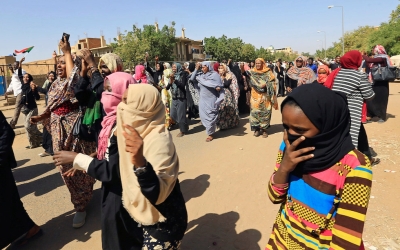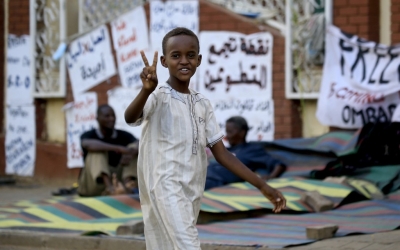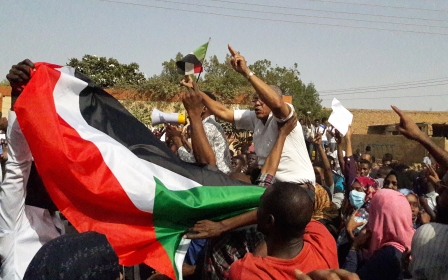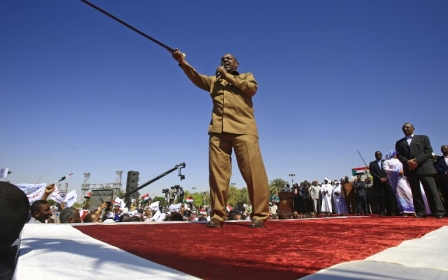Sudan investigator confirms detained teacher was beaten to death as protests rage on
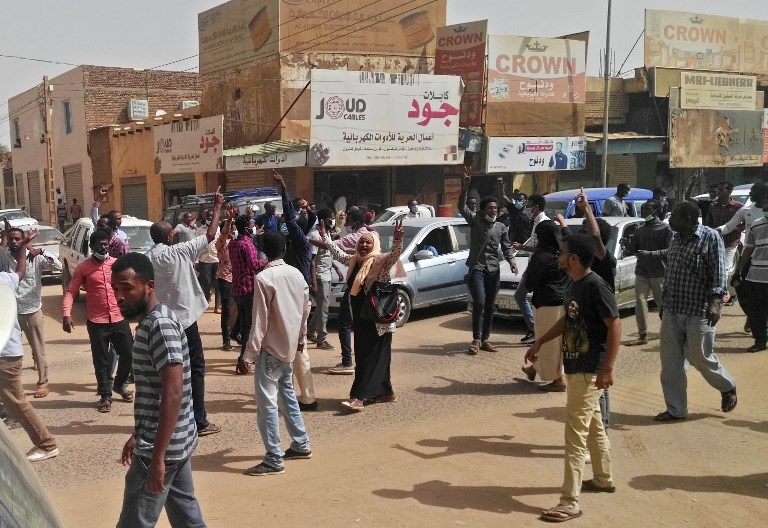
A Sudanese investigator has confirmed that a teacher from the eastern state of Kassala was killed due to injuries caused by a "solid object" during government interrogations, as anti-government protests continue to rage in the country’s capital.
Government forces arrested Ahmed al-Kheir, 36, last week, alleging that he was "one of the protest organisers" in his local community, AFP reported.
Amer Ibrahim, the head of a committee at the prosecutor's office investigating protest-related violence in Sudan, told reporters that Kheir had "died of wounds suffered on his body" while in detention.
"The cause of death is from various injuries to his body from a solid, flexible object, to his back, kidneys and thighs, and between his legs," he said.
A regional police chief had initially said the teacher died of food poisoning. The medical report released on Thursday showed no toxins were found in the teacher's body, Ibrahim said.
The investigator said he has called on the head of the team in charge of arresting Kheir to bring forward the security agents who carried out the interrogation.
Protests in the capital
Meanwhile, the Sudanese Professionals Association (SPA), which has led the protest movement since the unrest was sparked on 19 December, called for Thursday's demonstrations specifically in support of detainees who it says are being "tortured".
Hundreds of protesters rallied in Khartoum under the SPA call, according to AFP.
Protesters gathered in the downtown area of the capital, chanting their campaign's rallying cry of "freedom, peace, justice", witnesses told the news agency.
"Bring all your soldiers but today you will fall," chanted the protesters, witnesses said, adding that riot police swiftly confronted them with tear gas.
Protesters also staged rallies in the capital's eastern neighbourhood of Burri and some other areas of Khartoum, witnesses told AFP.
Video footage and photographs were swiftly uploaded on social media networks, some showing demonstrators being taken away by security agents.
While the chief of the National Intelligence and Security Service (NISS), Salah Ghosh, ordered the release of all detainees late last month, it is unclear how many have been freed.
According to government figures, at least 30 people have been killed and more than 400 injured so far in the near-daily protests, while more than 800 people have been arrested. Human Rights Watch said on 1 February that at least 51 protesters had been shot dead.
Outrage over so-called ‘public order law’
The latest protest came after President Omar al-Bashir acknowledged that youths, mainly women, were leading the rallies and said the public order law was "one of the reasons" for their anger, along with growing economic hardships.
Backtracking on Thursday, Bashir said that "enemies of Sudan" were funding a media campaign backing the demonstrators.
Activists say the decades-old public order law targets mainly women, often accusing them of "indecent dressing and immoral behaviour".
Hefty punishments including fines and jail terms are imposed on women found guilty under the legislation.
According to some Sudanese women's rights groups, more than 15,000 women were sentenced to flogging in 2016.
Protests first broke out in Sudan seven weeks ago, after a government decision to raise the price of bread.
They quickly turned into nationwide rallies against Bashir's three-decade-old rule, with crowds calling for his resignation.
Protesters out on the streets insist they are seeking a complete change in the country.
"It's not only the public order law that we are against," Tahani, a female demonstrator who asked not to be fully identified, told AFP.
Why are Sudanese protesting against their government?
+ Show - HideSudanese protests have evolved in the space of less than six months from complaints about bread prices to calls for long-term leader Omar al-Bashir to go and demands for a civilian-led transition to democracy.
Here's a summary of the key moments so far since the protests began.
19 December 2018: People take to the streets in the city of Atbara to protest against a government decision to triple the price of bread, torching a local ruling party office. By the next day protesters on the streets of Khartoum and other cities calling for "freedom, peace, justice". Police try to disperse the crowds, resulting in at least eight deaths. Dozens more will be killed in the weeks of protest that follow
22 February 2019: Sudanese President Omar al-Bashir declares a nationwide state of emergency. He swears in a new prime minister two days later, as riot police confront hundreds of protesters calling for him to resign
6 April: Thousands gather outside the army's headquarters in Khartoum, chanting "one army, one people" in a plea for the military's support. They defy attempts by state security forces to dislodge them and troops intervene to protect them
11 April: Military authorities announce they have removed Bashir and that a transitional military council will govern for two years. Despite celebrations at Bashir's demise, protest leaders denounce the move as a "coup" and the protesters remain camped outside army headquarters.
14 April: Protest leaders call on the military council to transfer power to a civilian government
20 April: Sudan's military rulers hold a first round of talks with protest leaders
27 April: The two sides agree to establish a joint civilian-military ruling council, but talks stall over differences in the composition of the council, with both sides demanding a a majority
15 May: With negotiators reported to be close to agreeing a three-year transition to civilian rule, military leaders suspend talks and insist protesters remove barricades outside the army's headquarters. Talks resume on 19 May but break down again on 20 May, with the opposition insistent that a civilian must head the transitional governing body
28 May: Thousands of workers begin a two-day strike to pressure the military rulers and call for civilian government
3 June: At least 35 people killed and hundreds injured, according to opposition-aligned doctors, as security forces firing live ammunition move to disperse the protest camp outside army headquarters
4 June: General Abdel Fattah al-Burhan, the head of the military council, announces that all previous agreements with protest leaders are scrapped and says elections will be held in nine months
"Once we overthrow the regime, we will change the old laws completely with new laws that respect the dignity and diversity of the Sudanese people."
Bashir and other senior Sudanese officials have repeatedly said the government can only be changed through elections.
The veteran leader, who came to power in a coup in 1989, is considering running for a third presidential term in a vote expected to take place next year.
Middle East Eye delivers independent and unrivalled coverage and analysis of the Middle East, North Africa and beyond. To learn more about republishing this content and the associated fees, please fill out this form. More about MEE can be found here.


